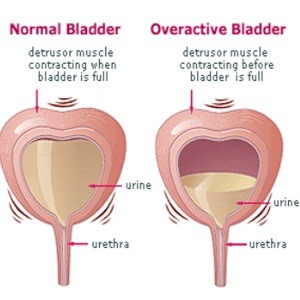This has happened to all of us at one point or another. But for some it starts occurring more frequently, sneaking up prematurely on your typical pee schedule.
When is it too much?
It’s difficult to identify an exact number for how many times is deemed excessive since everyone possesses unique compositions and thus unique peeing schedules; certain factors like caffeine and alcohol intake, sensitivity and size of your bladder, and hydration levels all play a role. But, there are a few standards that may signify you are going too frequently. According to Benjamin Brucker, M.D., an assistant professor of Urology at NYU Langone Medical Center, peeing upwards of 7 times a day may be an indicator of a greater problem [1]. Since individuals possess different norms, you don’t necessarily have to pee 7 times in one day to be out of your normal range. Rather, it’s more of a severe increase in comparison to your normal frequency, or even peeing 2 or 3 times in the middle of the night.
Causes of frequent urination
So if you are peeing too much, or in the middle of the night, why is this happening? The primary cause for the amount of urine and number of times urinating throughout the day is due to the amount of water you’ve consumed. Your bladder communicates with the brain, sending signals when it’s nearing full that instruct you to go pee. However, this signaling system can be skewed, resulting with signals being relayed to the brain way before the bladder is ever full.
UTIs
If the frequent urination is coupled with a fever or abdominal pain, it is likely that the culprit is a UTI [2].
Diabetes
Incessant urinating with exceptionally large amounts of pee can also be an indicator of both type 1 and type 2 diabetes. This occurs as a mechanism for the body attempting to eliminate unused glucose, an important sugar in metabolism, through urine.
Pregnancy
Further, in pregnancy the expanding uterus increasingly adds more pressure to the bladder, causing increased urination.
Enlarged Prostate
An enlarged prostate can squish the urethra, the tube you actually pee through, requiring more effort to push the urine out.
Other Causes
Frequent peeing may also occasionally be an early symptom for more severe cases, such as build up of scar tissue in the urethra, kidney stones, kidney infection or bladder cancer.
How to deal with it all
The first step in treating excessive urination is to determine its cause. In order to do this a trip seeking medical advice is often necessary, to rule out certain potential disorders and get a professional’s opinion when symptoms have begun to interfere with daily life. For UTIs or kidney infections, a doctor will prescribe antibiotics to fight the infection and with a complete cycle of the prescription symptoms should subside. In diabetes, managing insulin can mediate glucose levels decreasing the need to eliminate extra in the system. Those peeing often because of a new baby, may have to cope for the rest of the pregnancy, and understand there is no underlying medical issue. Several medications do exist for those diagnosed with an overactive bladder, which typically target a muscle called the detrusor muscle that is implicated in excessive peeing [3]. These are often accompanied by certain behavioral techniques in order to treat from multiple angles. Other potential fixes include:
Kegel exercises: daily pelvic exercises that focus on strengthening muscles of the urethra and those supporting the bladder Botox: directly calms the bladder by forcing relaxation upon muscles Biofeedback: increases control and sensations of pelvic muscles Dietary changes: avoiding diuretics (such as caffeine or spicy foods), adding more fiber to reduce constipation which can contribute to frequent urination Bladder training: training the bladder to be able to contain urine for longer periods of time by gradually increasing intervals between urinations
Ultimately, peeing too much can have negative effects on your daily life and can also be an indicator for other medical problems. If it’s significantly interrupting your daily routine, a physician should be consulted to determine the underlying cause. Many treatment options for specific issues exist, so don’t think you’ll be peeing frequently forever.

